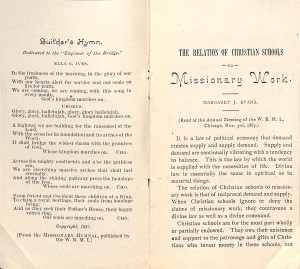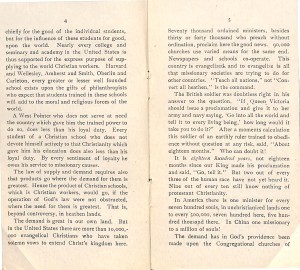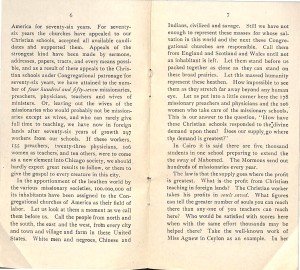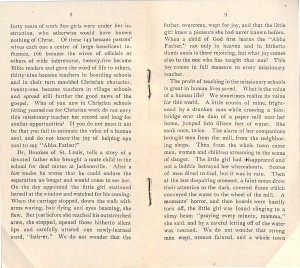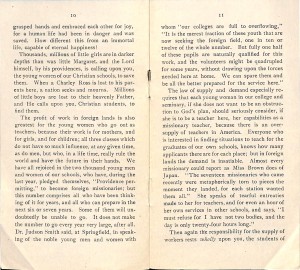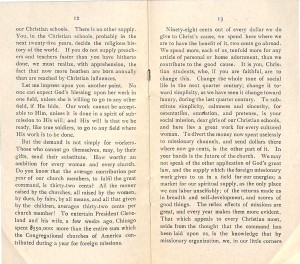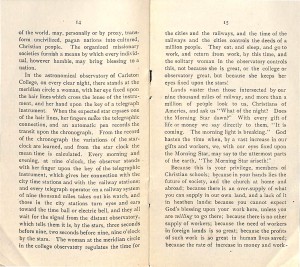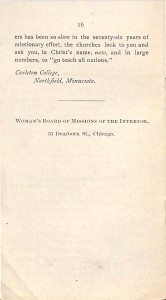Document 1: Evans Pamphlet
Author: Margaret J. Evans1, Ella G. Ives
Title: “The Relation of Christian Schools to Missionary Work”
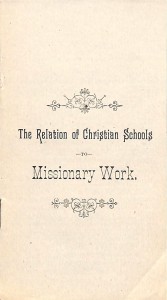
Date: 1887
Source: Religious Organization Records, Record Group Student Life, Box Number 2, Oberlin College Archives
Document Type: Printed Document (Chicago, IL: Women’s Board of Missions of the Interior, 1887.)
This document is a sixteen-page pamphlet (3 inches by 1 ½ inches) containing a hymn written by Ella G. Ives and an address written and given by Margaret J. Evans to the delegates of the annual meeting of the Woman’s Board of Missions of the Interior (W.B.M.I.) on 3 November 1887. The transcription has been edited to remove less significant portions of the address. The document is found in the Oberlin College Archives, as part of the record for the Young Women’s Missionary Society (1886-1890). Since it is in a folder labeled “Material loose in the volumes,” it is likely that one of the ladies of the society acquired the pamphlet and left it in one of the logbooks after sharing it with her peers. That would explain why it is in the files even though the authors of the material were not connected with Oberlin College. This is an example of the literature circulated among the Missionary Society, and therefore a window into how they–and women missionaries in general–approached their religion.
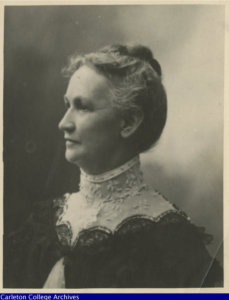
Margaret J. Evans was president of the Northfield, Minnesota, branch of the W. B. M. I. Her speech, directed toward students at Christian schools, highlights the ties between women’s education and missionary work. Evans emphasized Christians’ duty to spread their religion to “heathen” lands. She compares capitalist relations to the work of her organization and others like it through the use of economic language. While Evans’ rhetoric may contrast with values of today, her writing also alludes to the ways missionary work provided opportunities for women to enhance their agency and hold positions of authority. This is the rhetoric which in all likelihood influenced Luella Miner while she studied at Oberlin.
Builder’s Hymn2.
Dedicated to the “Engineer of the Bridge.”
Ella G. Ives3
In the freshness of the morning, in the glory of our youth,
With our hearts alert for service and our souls on fire for truth,
We are coming, we are coming, with this song in every mouth,
God’s kingdom marches on.
Chorus
Glory, glory, hallelujah, glory, glory hallelujah,
Glory, glory, hallelujah, God’s kingdom marches on.
A highway we are building for the ransomed of the Lord,
With the cross for its foundation and its arches of the Word:
It shall bridge the widest chasm with the promises of God,
Whose kingdom marches on. CHO.
Across the mighty continents and o’er the pathless sea,
We are stretching massive arches that shall last eternally;
And along the shining pathway press the footsteps of the free,
Whose souls are marching on. CHO.
From Orient and Occident these children of a King,
To claim a royal heritage, their souls from bondage bring:
And as they seek their Father’s House, their happy voices ring,
Our souls are marching on. CHO.
Copyright, 1887.
[From the MISSIONARY HYMNAL, published by the W. B. M.I]
It is a law of political economy that demand creates supply and supply demand. Supply and demand are continually vibrating with a tendency to balance. This is the law by which the world is supplied with the necessities of life. Divine law is essentially the same in spiritual as in material things.
The relation of Christian schools to missionary work is that of reciprocal demand and supply. When Christian schools ignore or deny the claims of missionary work, they contravene a divine law as well as a divine command.
Christian schools are for the most part wholly or partially endowed. They owe their existence and support to the patronage and gifts of Christians who invest money in these schools, not chiefly for the good of the individual students, but for the influence of these students for good, upon the world. Nearly every college and seminary and academy in the United States is thus supported for the express purpose of supplying to the world Christian workers.
[…]
A West Pointer4 who does not serve at need the country which gave him the trained power to do so, does less than his loyal duty. Every student of a Christian school who does not devote himself actively to that Christianity which gave him his education does also less than his loyal duty. By every sentiment of loyalty, he owes his service to missionary causes.
The law of supply and demand requires also that products go where the demand for them is greatest. Hence, the product of Christian schools, which is Christian workers, would go, if the operation of God’s law were not obstructed, where the need for them is greatest. That is, beyond controversy, in heathen lands.
[…]
This country is evangelized, and to evangelize is all that missionary societies are trying to do for other countries. “Teach all nations,” not “Convert all heathen,” is the command5.
[…]
In America there is one minister for every seven hundred souls, in unchristianized lands one to every 500,000, seven hundred here, five hundred thousand there. In China one missionary to a million of souls!
[…]
In the apportionment of the heathen world by the various missionary societies, 100.000,000 [sic] of its inhabitants have been assigned to the Congregational churches of America as their field of labor. Let us look at them a moment as we call them before us. Call the people from north and south, the east and the west, from every city and town and village and farm in these United States. White men and negroes, Chinese and Indians, civilized and savage. Still we have not enough to represent these masses for whose salvation in this world and the next these Congregational churches are responsible. Call them from England and Scotland and Wales until not an inhabitant is left. Let them stand before us packed together as close as they can stand on these broad prairies. Let this massed humanity represent these heathen. How impossible to see them as they stretch far away beyond any human eye. Let us put into a little corner here the 178 missionary preachers and physicians and the 106 women who take care of the missionary schools. This is our answer to the question, “How have these Christian schools responded to the divine demand upon them? Does our supply go where the demand is greatest?”
In Cairo it is said there are five thousand students in one school preparing to extend the sway of Mohamed. The Mormons send out hundreds of missionaries every year.
The law is that the supply goes where the profit is greatest. What is the profit from Christian teaching in foreign lands? The Christian worker takes his profits in souls saved. What figures can tell the greater number of souls you can reach there than any one of you teachers can reach here? Who would be satisfied with scores here when the same effort thousands may be helped there? Take the well-known work of Miss Agnew in Ceylon6 as an example. In her forty years of work 800 girls were under her instruction, who otherwise would have known nothing of Christ. Of these 143 became pastors’ wives each one a centre of large beneficent influence, 166 became the wives of officials or others of wide intercourse, twenty-five became Bible readers and gave the word of life to others, thirty-nine became teachers in boarding schools and in their turn moulded Christian character, twenty-one became teachers in village schools and spread still further the good news of the gospel. Who of you now in Christian schools fitting yourself for Christian work do not envy this missionary teacher her record and long for similar opportunities? If you do not must it not be that you fail to estimate the value of a human soul, and do not know the joy of helping one soul to say “Abba Father?”7
[…]
The profit of teaching in the missionary schools is great in human lives saved…Thousands, millions of little girls are in darker depths than was little Margaret8, and the Lord himself, by his providences, is calling upon you, the young women of our Christian schools, to save them.
[…]
The profit of work in foreign lands is also greatest for the young women who go out as teachers, because their work is for mothers, and for girls, and for children; all three classes which do not have so much influence, at any given time, as do men, but who, in a life time, really rule the world and have the future in their hands.
[…]
The law of supply and demand especially requires that each young woman in our college and seminary, if she does not want to be an obstruction to God’s plan, should seriously consider, if she is to be a teacher here, her capabilities as a missionary teacher, because there is an over-supply of teachers in America.
[…]
Then again the responsibility for the supply of workers rests wholly upon you, the students of our Christian schools. There is no other supply. You, in the Christian schools, probably in the next twenty-five years, decide the religious history of the world. If you do not supply preachers and teachers faster than you have hitherto done, we must realize, with apprehension, the fact that now more heathen are born annually than are reached by Christian influences.
[…]
Ninety-eight cents out of every dollar we do give to Christ’s cause, we spend here where we are to have the benefit of it, two cents go abroad. We spend more, each of us, tenfold more for any article of personal or home adornment, than we contribute to the good cause. It is you, Christian students, who, if you are faithful, are to change this. Change the whole tone of social life in the next quarter century; change it toward simplicity, as we have seen it change toward luxury, during the last quarter century. To substitute simplicity, calmness and sincerity, for ostentation, emulation, and pretense, is your social mission, dear girls of our Christian schools, and here lies a great work for every cultured woman. To divert the money now spent uselessly to missionary channels, and send dollars there where now go cents, is the other part of it. In your hands is the future of the church. We may not speak of the other application of God’s great law, and the supply which the foreign missionary work gives to us in a field for our energies; a market for our spiritual supply, as the only place we can labor unselfishly; of the returns made us in breadth and self-development, and scores of good things. The reflex effects of missions are great, and every year makes them more evident. That which appeals to every Christian most, aside from the thought that the command has been laid upon us, is the knowledge that by missionary organization, we, in our little corners of the world, may, personally or by proxy, transform uncivilized, pagan nations into cultured, Christian people. The organized missionary societies furnish a means by which every individual, however humble, may bring blessing to a nation.
[…]
Lands vaster than those intersected by our nine thousand miles of railway, and more than a million of people look to us, Christians of America, and ask us “What of the night? Does the Morning Star dawn?”9 With every gift of life or money we say directly to them, “It is coming. The morning light is breaking.” God hasten the time when, by a vast increase in our gifts and workers, we, with our eyes fixed upon the Morning Star, may say to the uttermost parts of the earth, “The Morning Star ariseth!”10
Because this is your privilege, members of Christian schools; because in your hands lies the future of society, and the church at home and abroad; because there is an over-supply of what you can supply in our own land, and a lack of it in heathen lands; because you cannot expect God’s blessing upon your work here, unless you are willing to go there; because there is no other supply of workers; because the need of workers in foreign lamds [sic] is so great; because the profits of such work is so great in human lives saved; because the rate of increase in money and workers has been so slow in the seventy-six years of missionary effort, the churches look to you and ask you, in Christ’s name, now, and in large numbers, to “go teach all nations.”
Carleton College,
Northfield, Minnesota.
___________________
Woman’s Board of Missions of the Interior
53 Dearborn St., Chicago.
Transcribed by Miriam DuVall, 8 May 2015
Proofed by Joanna Wiley, 6-7 July 2015
1 In addition to Lawrence University, Evans also studied in Berlin, Heidelberg, and at Oxford. She was not married until she retired from her post as Dean of Women at Carleton. Mission Studies: Woman’s Work in Foreign Lands, Volumes 19-20 (Chicago: 1901), 190, 338. “The 1903 Conference of Deans of Women of the Middle West,” Kent University, accessed May 4, 2015, http://www.personal.kent.edu/~jgerda/1903ConfDOW.html.
2To the tune of Battle Hymn of the Republic, written by Julia Ward Howe in 1861. John Stauffer and Benjamin Soskis, The Battle Hymn of the Republic: A Biography of the Song That Marches On (Oxford: Oxford University Press, 2013), 21.
3 Ella G. Ives was an author and teacher. She wrote many other hymns, including Little Field Preachers, In the Freshness of the Morning and Deepen Life’s Shadows. While not much about her life is known, there is evidence that she was a school teacher in New Haven, Connecticut, in the years 1866 to 1869. It also appears that she was the principal of the Melville School in Shawmut, Massachusetts, in 1891. (Seymour Eaton, Seymour Eaton’s Private Lessons for Young Teachers, Volume VI, (Boston: New England Publishing Company, 1889), vi.; Woman’s Board of Missions of the Interior, The Missionary Hymnal (Chicago: Woman’s Board of Missions of the Interior, 1889), 149. “Deepen Life’s Shadows,” accessed May 2, 2015, web address; “Annual Report of the Board of Education of the New Haven City School District: For the Year ending September 1, 1861” (1861): 67-72.; Secretary of the Commonwealth of Massachusetts, “Public Documents of Massachusetts being the Annual Reports of various Public Officers and Institutions for the year 1891.” (1892): 124-125.)
4 West Point is a United States military academy established as a fort during the American Revolutionary War, in 1778. President Thomas Jefferson signed legislation that established it as a U.S. Military Academy in 1802, and it continues as one today (West Point Military Academy, “A Brief History of West Point,” accessed May 2, 2015, http://www.usma.edu/wphistory/SitePages/Home.aspx).
5 Matthew 28:19: “Go ye therefore, and teach all nations baptizing them in the name of the Father, and of the Son, and of the Holy Ghost.”
6 Eliza Agnew (February 2, 1807 – June 14th, 1883) was an American missionary born in New York. In 1839, she secured an appointment to the Ceylon Mission of the American board of Boston. She served as a teacher in Ceylon (which became Sri Lanka in 1972) for 42 years, without furlough, at the Female Boarding School in Uduvil. She retired to Manipai, where she died of paralytic stroke on 14 June 1883 (Rev. S. W. Jackman, Who Was Who in American Biography: Historical Volume, 1607–1896 (Chicago: Marquis Who’s Who, 1963)).
7 “In Scripture there are many different names used to describe God. While all the names of God are important in many ways, the name ‘Abba Father’ is one of the most significant names of God in understanding how He relates to people. The word Abba is an Aramaic word that would most closely be translated as ‘Daddy.’ It was a common term that young children would use to address their fathers. It signifies the close, intimate relationship of a father to his child, as well as the childlike trust that a young child puts in his ‘daddy…’ Being a child of God and having the right to truly call Him ‘Abba Father’ is something that only born-again Christians are able to do (John 1:12-13)” (“What does it mean that God is Our Abba Father,” Got Questions.org, Accessed April 29, 2015, http://www.gotquestions.org/Abba-Father.html).
8 An omitted section of the speech tells the story of a young girl (Margaret) who jumps into a paper mill after being frightened by a drunken man walking by her. Men and women from across the village gathered in fright, thinking her to be dead. When she emerged alive, men and women alike cried. The author of the speech declared that “a human life had been in danger and was saved. How different this from an immortal life, capable of eternal happiness.”
9 Isaiah 21:11.
10 This appears to be a translation of the line “and Christ the Morning Star shines in your hearts” from the Second Epistle of Peter. (2 Peter 1:16-19).
